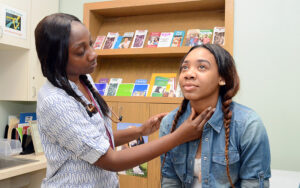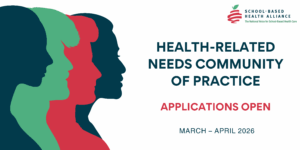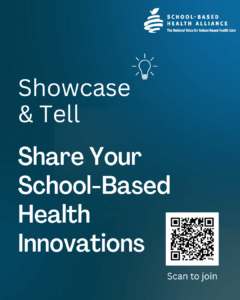Food security can be challenging to identify, especially when students present with concerns that seem unrelated. Adolescents may be reluctant to share what is happening at home, making it even more important for SBHCs to look beyond the surface. This SBHC story highlights how trusted relationships, consistent screening, and strong school and community partnerships can identify unmet needs and connect students to essential resources. By meeting students where they are every day, School-Based Health Centers play a vital role in supporting student health, stability, and success. Student’s name changed for confidentiality.
Emma is a 17-year-old female who was seen for acute visit in the School-Based Health Center (SBHC). At that visit, the Nurse Practitioner (NP) noted that she had lost weight since her annual well care visit about 8 months ago. It was approximately 20 lbs and was more than a little concerning to the NP. The patient reported that she had had no plan to lose the weight; she just was not eating as much. After addressing the acute issue of the visit, the NP brought Emma back for a follow up a few weeks later. The weight loss had continued. This prompted a work up with laboratory studies which were all negative. A standardized screening for eating disorders was also negative.
The NP, still very concerned, was able to refer Emma to a dietician. After some probing, the dietician was able to determine that the real issue was a lack of food at home. This was a ‘food insecure household’. Emma had been using the income from her part time job of $70 a week to buy “healthier foods”. The dietician helped the SBHC team to get Emma signed up for access to some local food banks. The school had a ‘Backpack Program’ where students could pick up a backpack filled with donated food for the household for the weekend. Sadly, upper level students were reluctant to participate due to the stigma.
During this time, the SBHC team had participated in a NYS, Department of Health learning collaborative promoted by the National School-Based Health Alliance. As a result of that program, the SBHC team decided to add food insecurity screening at all the annual exams. Beyond just annual exams, the team expanded that screening to at least once every year for all students that were seen for any reason. The SBHC staff also adopted the screening for any student presenting with weight concerns.
While identifying a serious problem is important, developing a solution is key. The SBHC staff worked with the school social worker to identify options for supporting students that had been identified as ‘food insecure’. The SBHC staff used a stipend they received for participating in the collaborative to help fund an in-school food pantry in the Middle/High School. The student that was initially identified and assisted had a positive outcome with appropriate weight gain. And while there was already a back pack program in the school, that program now supports the elementary school only. The food pantry in the Middle/High School allows students to self-select what foods appeal to them from a discrete site. Referrals to this intervention can be made not only through the SBHC but also through the school’s guidance office and by word of mouth. For Emma, this in-school food pantry came at a critical time. She is back to a normal weight. Hopefully, with food insecurity on the rise, other students will benefit now that this structure is in place.
The moral of the story: Food insecurity is real and School-Based Health Centers can help with a solution because they operate where the students ARE, in the school.
About the authors:
- Caroline Andrew, NP, is a nurse practitioner based in Cooperstown, New York, with more than 30 years of experience. Before entering school-based health, she spent much of her career in a suburban and urban family medicine practice, caring for patients across the lifespan. Now in her third school year in school-based health care, she values the opportunity to focus exclusively on pediatrics while still supporting students and their families. Caroline is passionate about meeting children where they are in school and ensuring they receive care they might not otherwise access. She finds great purpose in uniting health care with the school community and strengthening students’ well-being through accessible, compassionate care.
- Dr. Chris L. Kjolhede, MD, is a board-certified pediatrician based in Cooperstown, New York. He played a pivotal role in the development and expansion of the school-based health program at Bassett Healthcare Network, helping to bring primary medical, mental health, dental, and telemedicine services directly into rural schools. Dr. Kjolhede has also been a national leader in advancing school-based health care, testifying, informing policy, and representing SBHCs at the national level, including his service as the past AAP COSH representative for the School-Based Health Alliance. In recognition of his longstanding commitment to accessible and innovative care for youth, he received the 2019 Lifetime Achievement Award from the School-Based Health Alliance.
SBHA resources:



